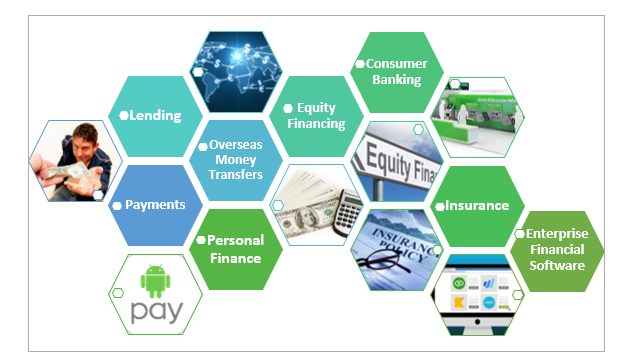While you may think that transferring a few dollars in your friends account through an app is not a big deal, it is actually revolutionary. So is purchasing grocery at your nearby local store or finding new ways to manage your personal finances, the ripple effect of technology has led to some ground-breaking innovations all around us in the twenty first century. The wave of technological innovations has swept across all sectors around the globe. In today’s era, Cloud And Mobile Technology allows workers to communicate and collaborate even when they're in the field, working remotely or stationed in different regions or same office.
Financial Technology, famously referred to as Fintech, encompasses any kind of technology and innovations that are targeting and modernising the traditional financial methods used in the delivery of financial services. In other words, it is an emerging industry that is successfully delivering improvements for advanced functioning of the financial ecosystem such as mobile payment apps like PayPal (PYPL), Get Report or Venmo to even cryptocurrency.
Back in the day, the term fintech would naturally imply back-end systems of banks or other financial institutions. However, today, with the amalgamation of latest technology with different financial services, large fintech start-ups have been able to bring about disruptions in the industry and provide financial services to both businesses as well as consumers. These dynamic new entrants to the industry have transformed various segments of the financial services market and continue to do so, presenting pressing competition to the conventional banking systems.
With that smartphone in your hand, you can conveniently manage funds, trade shares, pay for food as well as book a vacation. Why pay to see a financial advisor when financial advice is available online at a much lower rate ?
Fintech is a big and complex area.
Let’s look at how the fintech technology market can be broadly categorised.

I. Payments
One of the largest categories in the financial technology industry is payments, which enables consumers to send money to each other without having to turn to banks, which relatively charge hefty and exorbitant fees for even simple payments such as peer-to-peer transfers. Thus, fintech companies allow for quicker and cost-effective exchange of money.
For instance, technologies like blockchain have made it possible for these fintech companies like payment back-end and infrastructure providers; mobile wallets and seamless payment solution providers; and digital cryptocurrency markets such as Bitcoin; to process payments at a more reasonable cost than banks do.
II. Lending
The lending processes have also been transformed by financial technology companies in a way that consumers need not always consult banks or credit unions to borrow funds. This is because various Fintech companies are now offering affordable loans to the needy. In fact, these loans can also be applied for online and be approved fairly quickly without any major bottlenecks.
Not to say, that Fintech lenders do not assess a borrowers’ credit worthiness, but they do so quickly with an automated underwriting process. For example, the United States- based Kabbage and Canada-based Borrowell are two fintech players that utilise these new models to offer funding/credit directly to small businesses and consumers through an automated lending platform.
III. Personal Finance
This segment of financial technology industry focusses on helping individuals and households to better budget as well as manage their financial decisions and activities. Earlier, people would talk to financial advisors at the banks to get personal finance advice or use spreadsheets to budget their expenses. It is not the case now with plenty of apps available on the market that can offer advice and help with budgeting.
For instance, digital banking is an interactive online service offered to individuals so as to conveniently undertake activities like paying bills, transfer funds or even access their checking and savings accounts.
IV. Overseas Money Transfers
Traditionally, international money transfers have been quite expensive with banks and conventional money transfer companies charge up to 8% in fees. The fees used to be even exorbitant for big money transfers plus these transfers were predominantly slow.
So, the latest innovation in this arena by financial technology companies came as a respite for the consumers. These fintech offer quicker and cheaper international money transfers. Available in 40 countries across six continent, Ripple, a company in this category, transfers money internationally in about eight seconds. Now, that’s ground-breaking and high-speed!!
V. Equity Financing
Fintech has also touched and changed the way equity financing works too. The companies operating in this category of the fintech industry are basically easing out the process of raising funds for businesses. Some of the fintech enterprises provide a platform for accredited investors to connect with vetted start-ups while others use a crowdfunding model and allowing anyone to invest in new businesses.
Thus, in today’s era where the start-up ecosystem is bursting with new entrants every other day, these fintech companies simplify the fundraising process for businesses, making virtual fundraising possible since everything can be done online.
VI. Consumer Banking
Another category of fintech is consumer banking where in companies in this segment offer alternative for traditional banks to consumers as banks charge high fees. These companies also tend to reach out to underbanked consumers, especially those who can’t get approved for a credit cards.
VII. Insurance
Insurance is one of the more recent areas where the financial technology companies have ventured into and primarily focussing on distribution using new technologies like apps to reach customers that are underserved by insurance. Besides, they are characterised by greater flexible than traditional insurers.
VIII. Enterprise Financial Software
This area of fintech services include tools and software for managing accounts, invoices, taxes payroll, and shareholder management for a business. Different aspects of this section of fintech market include collaboration and workflow software that enable better communication and efficiency of internal processes; accounting and invoice software that improve time and resources spent on bookkeeping and invoicing; and data and analytics to provide protection against fraud security issues and cyber-crimes.






